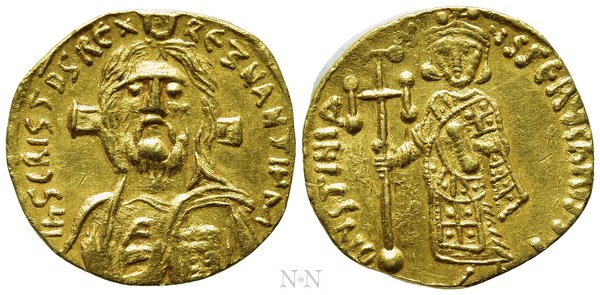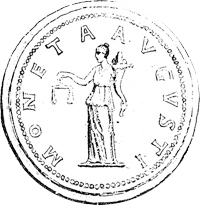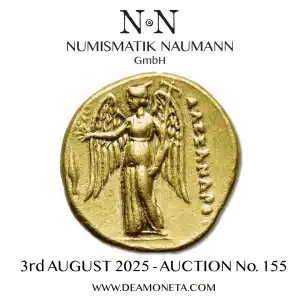



JUSTINIAN II (First reign, 685-695). GOLD Semissis. Constantinople.
Obv: IҺS CRISTOS RЄX RЄGNANTIHM.
Facing bust of Christ Pantokrator.
Rev: DN IЧSTINIANVS SER ҺCRISTIS.
Justinian standing facing, holding akakia and cross potent set upon globe.
MIB 12; DOC 10; Sear 1252.
Son of Constantine IV and Anastasia, Justinian II became emperor at the age of sixteen and was the last of the Heraclian dynasty. He initially renewed the peace with the Arabs, also at the behest of the new caliph, 'Abd al-Malik ibn Marwan, who agreed to very advantageous terms, and also sent ten thousand Mardaites who were integrated into the Byzantine army. Justinian was thus able to concentrate on the Balkans, sending troops to subdue Bulgarians and Slavs, and achieved an important victory, after which he deported thousands of Slavs to Asia Minor, important for the strengthening of the army and the economic system linked to the working of thematic land. However, probably for religious reasons, there was soon a return to war with the Arabs (691-692), who refused to depict Christ on the coins they minted to pay tribute to Byzantium. The decisive battle took place at Sebastopolis in Armenia, where the army of deported Slavs were corrupted by the caliph's gold. The defeat was a heavy one and Armenia submitted to the Arabs. Justinian II was also hated by the people for his fierce tax policy and by the aristocracy for his concessions to small landowners. Inevitably he was overthrown after ten years of his reign, with the revolt of Leontius in 695. The emperor was imprisoned and had his nose amputated, hence the nickname 'Rhinotmetus' = 'the Slit-Nosed'. Finally he was sent into exile in Crimea. However, he did not give up. He escaped more than one assassination attempt and married the daughter of the Khazars leader, who converted to Christianity and took the name Theodora. He allied himself with the Bulgarians, granting the title of Caesar to Khan Tervel in exchange for military support. He then succeeded in retaking Constantinople in 705 and had Leontius and Tiberius II executed. His second reign was marked by his thirst for revenge against those who had made attempts on his life, especially in the city of Cherson. Hence the revolt that dethroned him the second time, led by Bardanes who, after taking the name Philippicus, cut off Justinian's head and put an end to his dynasty
Condition: E xtremely fine.
Weight: 2.10 g.
Diameter: 17 mm.
Obv: IҺS CRISTOS RЄX RЄGNANTIHM.
Facing bust of Christ Pantokrator.
Rev: DN IЧSTINIANVS SER ҺCRISTIS.
Justinian standing facing, holding akakia and cross potent set upon globe.
MIB 12; DOC 10; Sear 1252.
Son of Constantine IV and Anastasia, Justinian II became emperor at the age of sixteen and was the last of the Heraclian dynasty. He initially renewed the peace with the Arabs, also at the behest of the new caliph, 'Abd al-Malik ibn Marwan, who agreed to very advantageous terms, and also sent ten thousand Mardaites who were integrated into the Byzantine army. Justinian was thus able to concentrate on the Balkans, sending troops to subdue Bulgarians and Slavs, and achieved an important victory, after which he deported thousands of Slavs to Asia Minor, important for the strengthening of the army and the economic system linked to the working of thematic land. However, probably for religious reasons, there was soon a return to war with the Arabs (691-692), who refused to depict Christ on the coins they minted to pay tribute to Byzantium. The decisive battle took place at Sebastopolis in Armenia, where the army of deported Slavs were corrupted by the caliph's gold. The defeat was a heavy one and Armenia submitted to the Arabs. Justinian II was also hated by the people for his fierce tax policy and by the aristocracy for his concessions to small landowners. Inevitably he was overthrown after ten years of his reign, with the revolt of Leontius in 695. The emperor was imprisoned and had his nose amputated, hence the nickname 'Rhinotmetus' = 'the Slit-Nosed'. Finally he was sent into exile in Crimea. However, he did not give up. He escaped more than one assassination attempt and married the daughter of the Khazars leader, who converted to Christianity and took the name Theodora. He allied himself with the Bulgarians, granting the title of Caesar to Khan Tervel in exchange for military support. He then succeeded in retaking Constantinople in 705 and had Leontius and Tiberius II executed. His second reign was marked by his thirst for revenge against those who had made attempts on his life, especially in the city of Cherson. Hence the revolt that dethroned him the second time, led by Bardanes who, after taking the name Philippicus, cut off Justinian's head and put an end to his dynasty
Condition: E xtremely fine.
Weight: 2.10 g.
Diameter: 17 mm.


